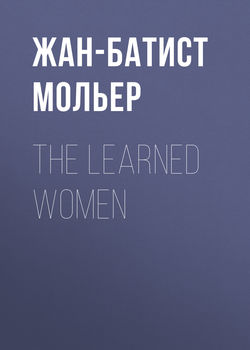Читать книгу The Learned Women - Жан-Батист Мольер, Жан-Батист Поклен Мольер, Мольер (Жан-Батист Поклен) - Страница 4
ACT I
SCENE III. – CLITANDRE, HENRIETTE
ОглавлениеHEN. Your frank confession has rather taken her aback.
CLI. She deserves such freedom of speech, and all the haughtiness of her proud folly merits my outspokenness! But since you give me leave, I will go to your father, to…
HEN. The safest thing to do would be to gain my mother over. My father easily consents to everything, but he places little weight on what he himself resolves. He has received from Heaven a certain gentleness which makes him readily submit to the will of his wife. It is she who governs, and who in a dictatorial tone lays down the law whenever she has made up her mind to anything. I wish I could see in you a more pliant spirit towards her and towards my aunt. If you would but fall in with their views, you would secure their favour and their esteem.
CLI. I am so sincere that I can never bring myself to praise, even in your sister, that side of her character which resembles theirs. Female doctors are not to my taste. I like a woman to have some knowledge of everything; but I cannot admire in her the revolting passion of wishing to be clever for the mere sake of being clever. I prefer that she should, at times, affect ignorance of what she really knows. In short, I like her to hide her knowledge, and to be learned without publishing her learning abroad, quoting the authors, making use of pompous words, and being witty under the least provocation. I greatly respect your mother, but I cannot approve her wild fancies, nor make myself an echo of what she says. I cannot support the praises she bestows upon that literary hero of hers, Mr. Trissotin, who vexes and wearies me to death. I cannot bear to see her have any esteem for such a man, and to see her reckon among men of genius a fool whose writings are everywhere hissed; a pedant whose liberal pen furnishes all the markets with wastepaper.
HEN. His writings, his speeches, in short, everything in him is unpleasant to me; and I feel towards him as you do. But as he possesses great ascendancy over my mother, you must force yourself to yield somewhat. A lover should make his court where his heart is engaged; he should win the favour of everyone; and in order to have nobody opposed to his love, try to please even the dog of the house.
CLI. Yes, you are right; but Mr. Trissotin is hateful to me. I cannot consent, in order to win his favour, to dishonour myself by praising his works. It is through them that he was first brought to my notice, and I knew him before I had seen him. I saw in the trash which he writes all that his pedantic person everywhere shows forth; the persistent haughtiness of his presumption, the intrepidity of the good opinion he has of his person, the calm overweening confidence which at all times makes him so satisfied with himself, and with the writings of which he boasts; so that he would not exchange his renown for all the honours of the greatest general.
HEN. You have good eyes to see all that.
CLI. I even guessed what he was like; and by means of the verses with which he deluges us, I saw what the poet must be. So well had I pictured to myself all his features and gait that one day, meeting a man in the galleries of the Palace of Justice [footnote: the resort of the best company in those days.], I laid a wager that it must be Trissotin – and I won my wager.
HEN. What a tale!
CLI. No, I assure you that it is the perfect truth. But I see your aunt coming; allow me, I pray you, to tell her of the longings of my heart, and to gain her kind help with your mother.
